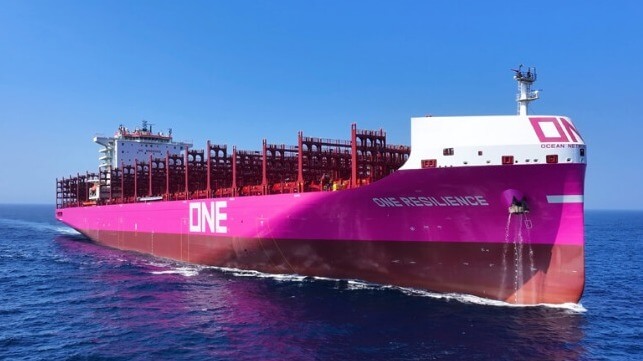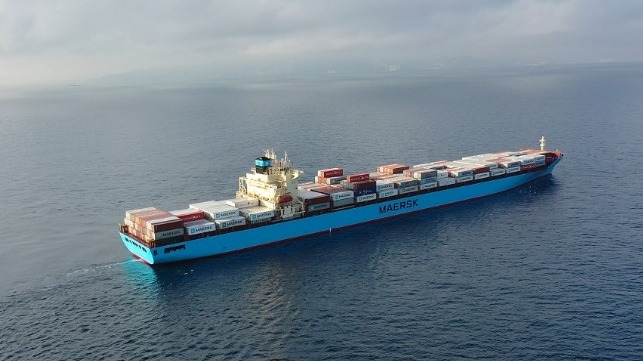FMC Delays Approval of New Alliance Between ONE, HMM, and Yang Ming

FMC Delays Approval of New Alliance Between ONE, HMM, and Yang Ming
The Federal Maritime Commission announced on Friday, December 6, that it is deferring the approval of the new alliance planned by Ocean Network Express (ONE), HMM, and Yang Ming as the successor to their current alliance which also includes Hapag-Lloyd. It is the second time this year the FMC said it needed additional time and more information to approve an alliance after taking a similar step for the filing by Maersk and Hapag-Lloyd to launch the Gemini Cooperation.
The application for the new association to be known as the Premier Alliance was filed on October 28 by the three carriers as the successor to their former working agreement known as The Alliance. The FMC noted that the agreement would have automatically become effective in 45 days, Thursday, December 12, unless it took the current action. The FMC has decided it needs additional information to make its decision.
The Commission reported the request for additional information was invoked because it is seeking documents and verifiable information to determine the competitive impacts of the agreement. It said the filing did not address some issues or there was insufficient information in the original filing. It determined the filing “lacks sufficient detail to allow for a complete analysis of potential competitive impacts and whether the agreement fully complies with all statutory requirements.”
The new alliance covers issues such as vessel sharing, exchanging vessel slots, the ability for the three companies to discuss and agree on issues such as the size, number, and operational characteristics of vessels operating under the agreement. The three companies said in September 2024 that they had determined to continue their working relationship and enhance it including a separate agreement with MSC Mediterranean Shipping Company after Hapag-Lloyd leaves the current The Alliance for its new cooperation in Maersk.
The Alliance was launched in 2016 as one of the three working relationships in the industry. It started operations in April 2017 and the companies report it involved 260 ships, calls at 82 ports, and covers 31 different services on the major trade routes.
The FMC’s action comes a day after the Premier Alliance announced details of its first sailings and plans to tamp up operations starting in February 2025. They outlined plans to reach 24 services on the east-west routes. It includes 24 sailing as the first demonstrations of the new cooperation. It is scheduled to start in 2025 and run for five years.
Under the rules of the review the FMC launched, it holds the approval of the agreement while it waits for the requested additional information. Once it deems the application complete, the FMC has a further 45 days for review.
The FMC deferred the approval of Gemini Cooperation in July 2024 for similar issues. It let the agreement go forward two months later in September while saying it still had concerns over the competitive impact. FMC Chairman Daniel Maffei reported they had run out of time so the agreement would proceed but the commission would continue to closely watch the implementation. Complaints about the alliances among the major carriers and the concentration of the industry within the three working alliances drove concerns for reforms of the FMC’s authority and calls from the U.S. Congress to tighten oversight to ensure competition among the ocean carriers.
FMC Investigating Reports Maersk Line Ships Were Denied Port Calls in Spain

The U.S. Federal Maritime Commission is starting an investigation and seeking information after reports that Spain denied requests for port calls by Maersk Line, Ltd. ships operating under the Maritime Administration’s Maritime Security Program. They are seeking explanations citing the FMC’s authority to protect the foreign trade of the United States.
The Commission cites a report from The Maritime Executive in November that said two Maersk Line, Ltd. vessels sailing from the United States to the Mediterranean were being diverted from scheduled port calls in Spain. The vessels, Maersk Denver and Maersk Seletar, operate for the U.S. subsidiary of Maersk which has a contract to transport U.S. government cargo and receives a retainer from MARAD for availability.
Activists protesting the war in Gaza had appealed to the Spanish government to enforce a restriction enacted in May 2024 not to aid vessels transporting military cargo. The groups alleged the Maersk Line, Ltd. vessels, which had scheduled port calls in Spain, were carrying a wide array of military equipment which they said was being supplied to Israel to support the actions in Gaza. Spain had previously turned away a Danish cargo ship in May reported to be carrying explosives after similar activist objections. It articulated a government policy not to support the transportation of military equipment.
Spain’s Foreign Ministry in November confirmed that it had determined not to permit the port calls of the Maersk vessels. The AIS and online schedule of the vessels showed them diverting to Tangier Med, where they were also met by protestors.
In an official notice of the investigation to be published on December 6, the FMC writes, “The Commission is concerned that this apparent policy of denying entry to certain vessels will create conditions unfavorable to shipping in the foreign trade, whether in a particular route or in commerce generally.”
The Commission has consistently held that its powers do not only protect U.S.-flagged shipping but also foreign governmental actions that are detrimental to third-flag carriers that can create conditions unfavorable to shipping in U.S. foreign trade. At this initial stage of the investigation, the Commission says it will focus on providing a route for interested parties, including the Government of Spain and common carriers that have been denied entry into Spanish ports, to provide information, perspectives, and proposed solutions. They are seeking information to confirm if vessels were barred from calling in Spain and an “explanation or justification provided by the Government of Spain.”
Under its authority, the FMC reports it can levy significant remedies, including substantial daily fines, and barring foreign vessels from calling at U.S. ports. The filing states the fines can be up to $2.3 million per voyage.
No comments:
Post a Comment